STRUGGLE FOR
THE MIDDLE SEA
STRUGGLE FOR
THE MIDDLE SEA

The Great Navies at War in the
Mediterranean Theater, 19401945
Vincent P. OHara
NAVAL INSTITUTE PRESS
Annapolis, Maryland
The latest edition of this work has been brought to publication with the generous assistance of Marguerite and Gerry Lenfest.
This book was originally brought to publication with the generous assistance of Edward S. and Joyce I. Miller, as well as Marguerite and Gerry Lenfest.
Naval Institute Press
291 Wood Road
Annapolis, MD 21402
2009 by Vincent P. OHara
All rights reserved. No part of this book may be reproduced or utilized in any form or by any means, electronic or mechanical, including photocopying and recording, or by any information storage and retrieval system, without permission in writing from the publisher.
ISBN 978-1-61251-408-6 (eBook)
The Library of Congress has cataloged the hardcover edition as follows:
OHara, Vincent P., 1951-
Struggle for the Middle Sea : the great navies at war in the Mediterranean theater, 1940-1945 / Vincent P. OHara.
p. cm.
Includes bibliographical references and index.
1. World War, 1939-1945Mediterranean Sea. 2. World War, 1939-1945Naval operations. 3. Mediterranean SeaHistory, Naval20th century. 4. Great Britain. Royal NavyHistoryWorld War, 1939-1945. 5. France. MarineHistoryWorld War, 1939-1945. 6. Italy. Regia MarinaHistoryWorld War, 1939-1945. 7. Germany. KriegsmarineHistoryWorld War, 1939-1945. 8. United States. NavyHistoryWorld War, 1939-1945. I. Title.
D779.M43O34 2009
940.54293dc22
2009006310
 Print editions meet the requirements of ANSI/NISO z39.48-1992 (Permanence of Paper).
Print editions meet the requirements of ANSI/NISO z39.48-1992 (Permanence of Paper).
14 13 12 11 10 09 9 8 7 6 5 4 3 2
First printing
Contents
Tables
Charts
Maps

W hile the author retains complete responsibility for all opinions and errors of fact, he thanks his family, friends, and associates whose generosity has advanced this work by providing information, by reading and challenging his interpretations, or questioning facts. As always, he thanks first his father and mother, Vincent P. OHara Sr. and Margaret H. OHara. He thanks his editor, Thomas J. Cutler, for supporting and nourishing this work, and his friend Enrico Cernuschi, who reviewed the manuscript and offered many suggestions. Karl Zingham, John Jordan, Zvonimir Freivogel, Jack Greene, Carlos Rivera, David W. Dickson, Richard Worth, Stephen Dent, Dennis Dove, Barbara Tomblin, Andrew Smith, and Robert von Maier have contributed ideas, resources, or comments. The editors and staff of the Naval Institute Press have been professional and consistently helpful. Finally, he thanks his family, wife Maria OHara-Rhi, son Vincent T. OHara-Rhi, and daughter Yunuen Rhi for their interest in and patience with the long process of bringing this book to fruition.

Anyone who wants to know about the grand strategy of the worlds empires cannot do better than study closely the Mediterranean Sea.
Joseph S. Roucek, The Geopolitics of the Mediterranean
E nrico Ricciardi was a young midshipman fresh from the Livorno Naval Academy serving aboard the light cruiser Eugenio di Savoia, flagship of Rear Admiral Luigi Sansonettis 7th (Cruiser) Division. Eugenio di Savoia was about to fight in Italys first fleet engagement against Great Britain. Ricciardi, stationed on the flag bridge, remembered his admirals reaction when combat commenced: When we saw the first salvo, even before the sound reached us, Admiral Sansonetti excitedly placed his hand on my shoulder and said to me these exact words. Take a log sheet and note this down: at 1520 on 9 July 1940 on the Ionian Sea an Italian battle fleet fired its first gunshots against the English. He added, This is a historic moment, and you, young man, should be proud to be living it.
Aboard the British warships, similar excitement reigned when the signal Enemy battle fleet in sight fluttered up HMS Neptunes halyards. The British commander, Admiral Andrew Browne Cunningham, noted this was the first time such a signal had been seen in the Mediterranean since the time of Nelson.
Italy declared war on 10 June 1940, nine months into the conflict that became World War II. The Action off Calabria, as this engagement is known in English histories, was the wars first fleet clash and Britains first attempt to establish sea control in the central Mediterranean. Accordingly expectations ran high, but rather than leading to a crushing naval victory, like Trafalgar, Calabria proved to be just the opening round in a protracted and bitter campaign that ultimately enmeshed five of the worlds six great navies and dragged on to the very end of the European war.
Initially, the Royal Navy of Great Britain and its dominions and the Republic of Frances Marine Nationale faced the kingdom of Italys Regia Marina. Within weeks, after Frances defeat, a three-way conflict developed, with Britain fighting Italy on one hand and the Vichy French regime on the other. In 1941 Germanys Kriegsmarine joined Italy, while the Anglo-French conflict simmered with periodic flare-ups. In November 1942, the U.S. Navy became a major Mediterranean participant, while significant French elements reenlisted in the Allied cause. In September 1943, the Kingdom of Italy quit the Axis and joined the Allies, and from that point to the end of the war Germany battled the combined forces of Great Britain, the United States, France, Italy, and a host of minor allies.
The struggle for the Middle Sea was World War IIs longest air-land-sea campaign; it was a war of attrition in which the Axis confounded Londons early quest for a decisive result and then slowly ground the British down until the Americans entered the theater in forcetwo and a half years after the campaign began. The Axis together and then Germany with her minor allies delayed the Allies on their road to victory for another two and a half years. By May 1945 Germany had lost Berlin but still maintained a tiny, defiant naval presence on the Middle Sea.
Myths and Misconceptions
The Mediterranean was the sea of Homer, and it has retained into modern times its ability to inspire myth. The war fought there is often related in partisan terms that contain misconceptions, simplifications, or distortions. These legends are not the subject of this work, but it is necessary to briefly identify them before moving on.
Next page

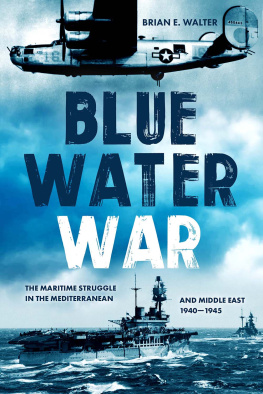
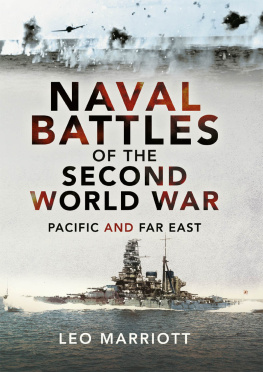
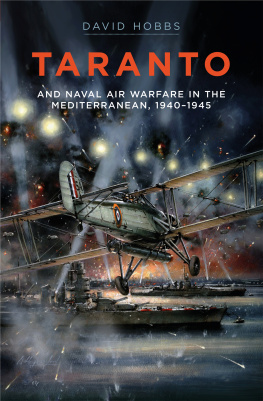
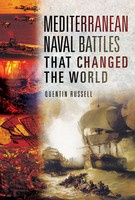
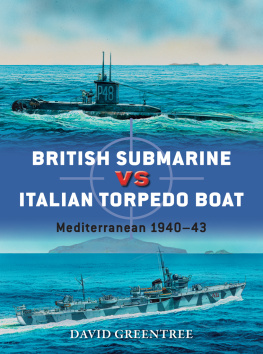
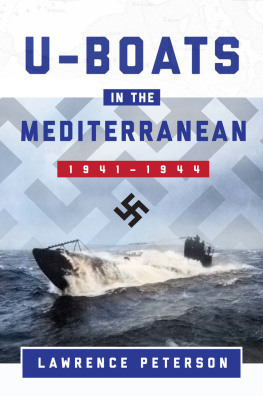

 Print editions meet the requirements of ANSI/NISO z39.48-1992 (Permanence of Paper).
Print editions meet the requirements of ANSI/NISO z39.48-1992 (Permanence of Paper).